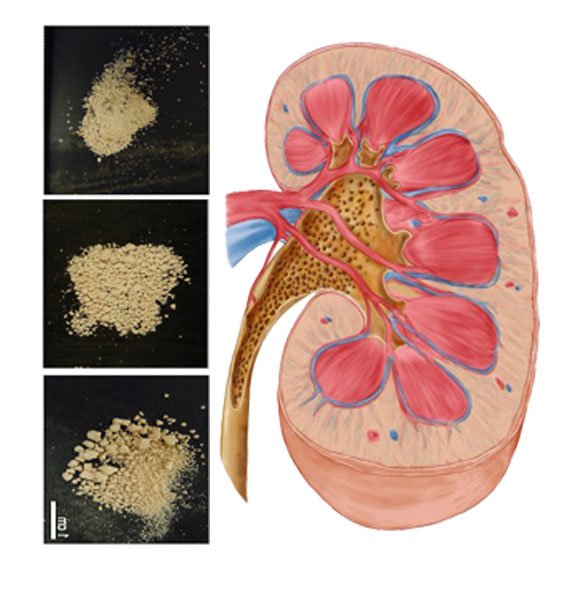
Hello steemits, today I bring you this post to know what is possible to form in our kidneys.
What is grit?
They are crystals as small as a grain of sand (0.2 mm), which may be present in the kidney, ureter, or bladder because they are formed by substances in the urine, such as phosphate salts and calcium carbonate or uric acid. The grit can form a solid material or piece, thus producing stones or kidney stones (lithiasis), which can be as thick as a pearl, 3 cm or more.

Grit is of little importance because of its size and almost never causes pain or obstruction in these urinary tracts, but it becomes of interest when stones are formed.
Most kidney stones are removed from the body without medical help. Sometimes a stone is not easy to remove, it can get stuck in the urinary tract, block the flow of urine and cause great pain. And, if not treated in time, the kidney can dilate and even cause loss.
The kidneys are one of the fundamental organs in the detoxification and purification of our body, because they deal with the elimination of toxins and waste that the body does not need. It is one of the main blood filters, purifying and retaining what can be useful for our body. They also regulate blood pressure, stimulating the production of red blood cells.
Causes of kidney grit
Their causes are very varied, among them are:
A bad diet.
High consumption of salt, dairy products and red meat.
Small amount of liquids in the day to day.
Main symptoms

The following symptoms may indicate grit or kidney stones in the kidneys:
Pain in the genital area, especially when the grit moves.
change in color of the urine from yellow to brown or red with the blood present It even causes foul odor and turbidity in the urine.
Burning sensation when urinating.
Lumbar pain, at the end of the back or to the side.
Fever and chills.
Nausea and general discomfort.
Nephritic colic or kidney pain. This is a sudden, severe pain that is usually caused by stones in the tube from the kidneys to the urinary tract near the urethra. In men, the pain is so intense that it is compared to labor and delivery.
How is it diagnosed?
Your diagnosis is deduced through urine, blood and imaging tests.
Most of the time, just by changing some habits and, in a few cases, by adding medical treatment, these grits can be expelled, taking into account where they are at the time of diagnosis. In most cases they do not have to be treated, it is only recommended to follow up with your urologist, unless you have a renal pain or renal colic.
It is important to know that most cases of low back pain are caused by other problems that may include the spine or muscle problems. If in doubt, visit your urologist.
How do you get rid of the grit in your kidneys?
They can be eliminated by dieting to reduce and eliminate them naturally. However, if a stone does not pass on its own, oral treatment and other methods, such as shockwave or surgery, are needed.
Recommendations to avoid the formation of sandstones
To care for and maintain good kidney health, we must follow these recommendations:
It is essential to drink liquids of 1 to 2 litres per day. It can be water, natural juices (such as lemon, pomegranate, cucumber, watermelon, melon and eggplant), teas or infusions of horsetail, Indian cane or cat's claw.
Eat 2 to 3 servings of dairy a day.
Avoid excess salt, meat, fish, eggs, soft drinks, caffeine and spicy foods.
Check your blood pressure.
Eat a varied and balanced diet.
Purify the kidneys at least once a year, with depurative infusions such as dandelion infusion.
Imagen #1
Imagen #2
Imagen #3
Imagen #4
Imagen #5
Imagen #6
Imagen #7

Great article. Thank you. I have been experiencing some of these symptoms and wondering if this could be the cause.
If you feel several of these symptoms, I recommend that you have a urine test and go to the Urologist, thank you for your feedback.